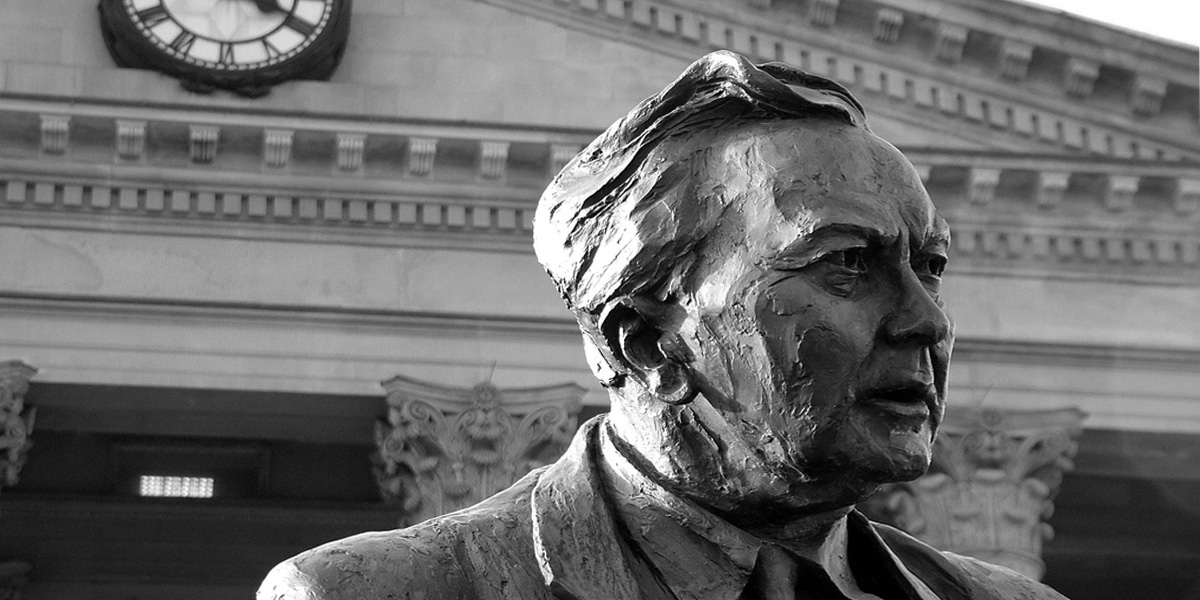Fifty years on: Harold Wilson’s lessons for Ed
By the time Ed Miliband came into the world on Christmas eve 1969, Harold Wilson had been prime minister for five years, at the helm of only the second-ever majority Labour government. Fifty years on from Wilson’s first election, what...
By the time Ed Miliband came into the world on Christmas eve 1969, Harold Wilson had been prime minister for five years, at the helm of only the second-ever majority Labour government. Fifty years on from Wilson’s first election, what lessons are there for Labour’s next prime minister?
Britain’s place in the world, the size and shape of its economy, its dominant cultural and social attitudes, were all markedly different from today. Wilson was a new leader, attempting to win an election after 13 years in opposition. Britain was enjoying economic growth, young people walked into well-paid jobs, the Beatles and the Rolling Stones could be heard from every teenager’s bedroom. Wilson’s version of socialism, with its appeal to classless modernity and the white heat of technology, suited the zeitgeist. By contrast, Ed Miliband faces an austere, divided Britain, uncertain of its future.
Yet the similarities are there too. Harold Wilson was an unlikely leader, standing in February 1963 following the shock death of Huge Gaitskell. Standing against James Callaghan and George Brown, he did not win on the first ballot. 129 of Wilson’s parliamentary colleagues did not want him to be leader. In the second ballot he secured 144 votes against Brown’s 103, in a contest Tony Crosland characterised as a choice between “a crook and a drunk”. Wilson faced a Tory cabinet chock-full of Old Etonians, led by a 14th Earl.
Labour’s 1964 manifesto promised a ‘new Britain’, with full employment, a faster industrial expansion, distribution of industry through the country, an end to the chaos in transport and travel, a brake on rising prices and a solution to the balance of payments problem. The answer was ‘a national plan’ and the weapon was the Department for Economic Affairs.
The DEA is an abject lesson in the failure of Whitehall machinery to translate into economic change. It rose like a mighty skyscraper against the London skyline, but by 1969 it had been demolished, like so many other 1960s edifices, because it didn’t work. It attempted to challenge the Treasury, and failed. Ed Miliband will do well to avoid similarly grandiose changes to the machinery of government.
The national plan included all kinds of emphases we would recognise in Miliband’s leadership today: devolution to the nations and regions; measures to ease the cost of living; an end to price ‘rackets’; a fair tax system, including a block on “the notorious avoidance and evasion devises that have made a mockery of so much of our tax system”.
Wilson’s Labour promised class sizes no bigger than 30 in all schools; an end to the 11-plus, and a rise in the school leaving age to 16 in a “massive expansion in higher, further and university education”.
On housing, the party pledged fair rents, slum clearances, and a target of 400,000 new houses built a year (Ed Miliband’s target is 200,000 per year by 2020). On health, they promised no structural changes to the NHS, but instead more hospitals, more doctors and nurses and no introduction of charges.
These themes are all redolent of Miliband’s policies. Harold Wilson recognised that the 1960s voter was concerned with the prices of their goods and services, their rights as consumers, and their aspiration to own a decent home and see their children work in well-paid a job with prospects. The only discordant note is the section which addresses all the extra leisure time the British worker would enjoy thanks to “automation, new sources of energy and the growing use of the electronic calculating machine.”
So what happened next? Wilson was buffeted by a devaluation crisis which diminished his own reputation. He kept British boots off the ground in Vietnam, but was criticised anyway for supporting the Americans. His attempts at union reform, through the white paper In Place of Strife, failed and would wait until Thatcher did the job in a far less sympathetic way. Labour lost ten by-elections, nine to the Tories and one to the Liberals, and lost the 1970 election on a 4.5 per cent swing.
Yet despite all the scandal and intrigues, all around us are the new universities, new towns, new motorways, new companies, new culture and liberating social reforms which were born in Wilson’s New Britain.
The much-missed Ben Pimlott, in his definitive biography, wrote: “Wilson was an egalitarian by instinct and conviction.” He believed “a more equal society would be a more efficient and economically successful one.” Wilson modernised the economy and welfare state, and made society fairer. He reduced poverty, and lessoned the gap between rich and poor. If we can say the same about Ed Miliband in ten years’ time, he will stand alongside Harold Wilson as a great Labour prime minister.
